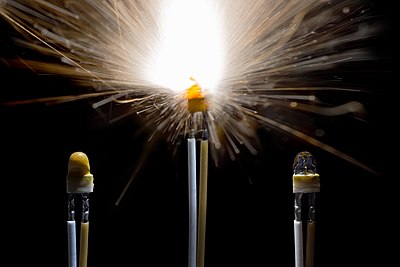Talk:Electric match
| This article is rated Start-class on Wikipedia's content assessment scale. It is of interest to the following WikiProjects: | |||||||||||||||||||||||||||||||||||||||||||||||||||||||
| |||||||||||||||||||||||||||||||||||||||||||||||||||||||
Schematic symbol
[edit]What does an electrical match look like on an electrical schematic? Are there standardized symbols? Swooch (talk) 06:52, 30 April 2012 (UTC)
two kinds of devices
[edit]This article currently confuses two different kinds of devices:
- One kind of device made of a pyrogen-coated heating wire, designed for one-time use, using only relatively low voltage, designed to light something that can only be lit once, such as fireworks or model rockets.
- Another kind of device that generates a relatively high voltage to create sparks across its spark-gap, such as piezo ignition or electronic ignition, designed to light something that can be lit many times, such as propane grills, natural gas hot water heaters, the "combustion" part of internal combustion engines, etc.
My close neighbors use the terms "electric match", "electric igniter", and "igniter" interchangeably as synonyms to refer exclusively to the heating-wire devices, and never refer to the spark-gap devices. My reading of the pyrotechnic initiator article and the references in this article seem to agree with that usage.
How can we avoid confusion in this article? Should we (a) reduce this article to focus on electric matches, by removing all the spark-gap stuff -- perhaps moving that stuff to the "piezo ignition" article or the "electronic ignition" article? Or should we (b) keep an expanded, more general article that discusses both kinds of devices -- perhaps under some other name? --DavidCary (talk) 17:10, 26 July 2013 (UTC)
External links modified
[edit]Hello fellow Wikipedians,
I have just modified one external link on Electric match. Please take a moment to review my edit. If you have any questions, or need the bot to ignore the links, or the page altogether, please visit this simple FaQ for additional information. I made the following changes:
- Added archive https://web.archive.org/web/20080802230549/http://www.electricmatch.com:80/disclm.html to http://www.electricmatch.com/disclm.html
When you have finished reviewing my changes, please set the checked parameter below to true or failed to let others know (documentation at {{Sourcecheck}}).
This message was posted before February 2018. After February 2018, "External links modified" talk page sections are no longer generated or monitored by InternetArchiveBot. No special action is required regarding these talk page notices, other than regular verification using the archive tool instructions below. Editors have permission to delete these "External links modified" talk page sections if they want to de-clutter talk pages, but see the RfC before doing mass systematic removals. This message is updated dynamically through the template {{source check}} (last update: 5 June 2024).
- If you have discovered URLs which were erroneously considered dead by the bot, you can report them with this tool.
- If you found an error with any archives or the URLs themselves, you can fix them with this tool.
Cheers.—InternetArchiveBot (Report bug) 05:35, 22 December 2016 (UTC)
File:Exploding E match collage.jpg scheduled for POTD
[edit]Hello! This is to let editors know that the featured picture File:Exploding E match collage.jpg, which is used in this article, has been selected as the English Wikipedia's picture of the day (POTD) for November 30, 2020. A preview of the POTD is displayed below and can be edited at Template:POTD/2020-11-30. For the greater benefit of readers, any potential improvements or maintenance that could benefit the quality of this article should be done before its scheduled appearance on the Main Page. If you have any concerns, please place a message at Wikipedia talk:Picture of the day. Thank you! Cwmhiraeth (talk) 11:27, 12 November 2020 (UTC)

|
An electric match is a device that uses an externally applied electric current to ignite a combustible compound. This image is a collage of three photographs depicting an electric match at the moment of ignition in the centre, together with the same match before detonation on the left and after detonation on the right. To ignite the match, a suitable electric voltage is applied to a heating element, typically a loop or coil of thin wire, which is encased in a quantity of a flammable pyrotechnic initiator fluid, which then ignites. Photograph credit: Lucasbosch
Recently featured:
|
- Start-Class Explosives articles
- High-importance Explosives articles
- C-Class military history articles
- C-Class military science, technology, and theory articles
- Military science, technology, and theory task force articles
- C-Class Classical warfare articles
- Classical warfare task force articles
- Start-Class Rocketry articles
- Unknown-importance Rocketry articles
- WikiProject Rocketry articles




